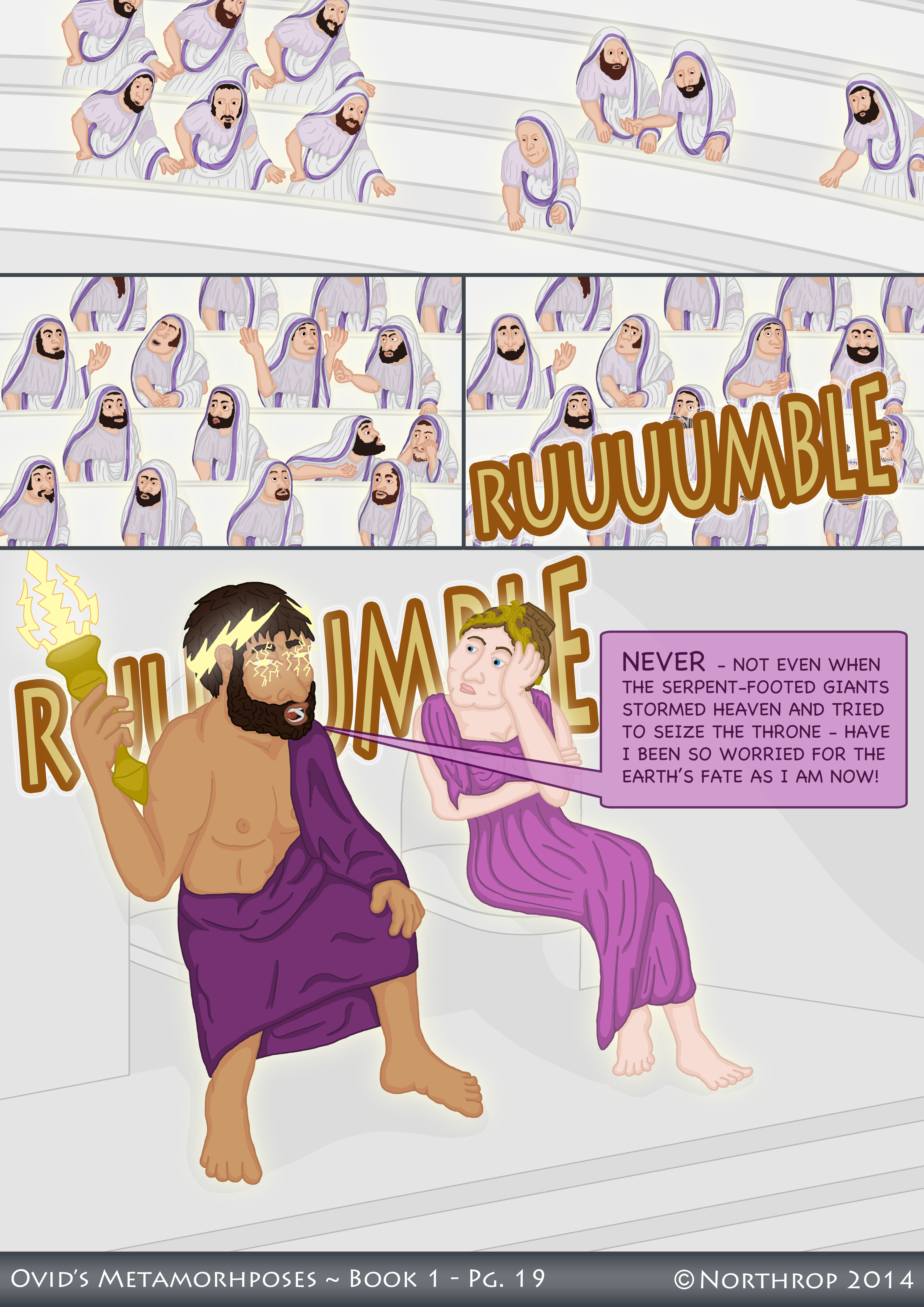Met. 177-84 – The Council Arrives
ERGO UBI MARMOREO SUPERI SEDERE RECESSU,
CELSIOR IPSE LOCO SCEPTROQUE INNIXUS EBURNO
TERRIFICAM CAPITIS CONCUSSIT TERQUE QUATERQUE
CAESARIEM, CUM QUA TERRAM MARE SIDERA MOVIT.
TALIBUS INDE MODIS ORA INDIGNANTIA SOLVIT:
“NON EGO PRO MUNDI REGNO MAGIS ANXIUS ILLA
TEMPESTATE FUI, QUA CENTUM QUISQUE PARABAT
INICERE ANGUIPEDEM CAPTIVO BRACCHIA CAELO.”
THEREFORE, WHEN THE GODS WERE SEATED IN THE MARBLE HALL,
HE, SITTING HIGHER AND LEANING ON HIS IVORY SCEPTER,
SHOOK THE AWESOME LOCKS ON HIS HEAD THRICE AND FOUR TIMES,
WITH WHICH HE MOVED THE EARTH, SEA AND STARS.
THEN IN THIS WAY HE LOOSED HIS ANGERED MOUTH:
“NOT [EVEN] IN THAT STORM, WHEN A HUNDRED SNAKEY-FOOTED
GIANTS PREPARED TO LAY HANDS ON CAPTIVE HEAVEN
WAS I MORE ANXIOUS FOR THE KINGDOM OF EARTH.”
Well, this page took me a long time. I wanted to find the perfect way to depict the council of gods – no easy feat as it turns out! Councils of the gods have a storied tradition. Homer probably has the definitive version in the Iliad, but Ovid was no doubt also thinking of Vergil’s council from the Aeneid when he wrote this scene. Pretty much every epic – or story pretending to be an epic at least – has to have a council of the gods. Traditionally, these councils are called in response to crises in human affairs, reflecting the way in which mortals can easily impinge upon the divine realm in myth (kind of ego-centric, but that’s our nature as a species, I guess). In the Iliad, the gods are arguing about the Trojan War, with all of them taking sides; in the Aeneid, it’s the Trojans/Future Romans against the Latins. It is important to note that they are usually marked by discord (usually stirred by Jupiter and Juno bickering). Here, however, as we shall see soon, everyone is in agreement pretty much. The world has gone off the rails; human sin is the crisis. All the gods can agree on this. What is to be done, however, Jupiter still has not revealed. Nevertheless, it is his autocratic decision. His power and position reflects contemporary Roman politics. The senate metaphor we saw last week is carried over, as Jupiter now becomes Augustus, the emperor. Because of this, I chose to depict the gods as senators. They wear their senatorial togas, with a purple band running around the border, with their heads covered, a gesture often associated with religious osbervance. In this way, I wanted to reflect the divine nature of the setting, along with its patent political undertones.
* Thanks to Daniel Unruh for helping me nuance this statement for accuracy from my original wording.
** That is, the Senate House

Discussion ¬